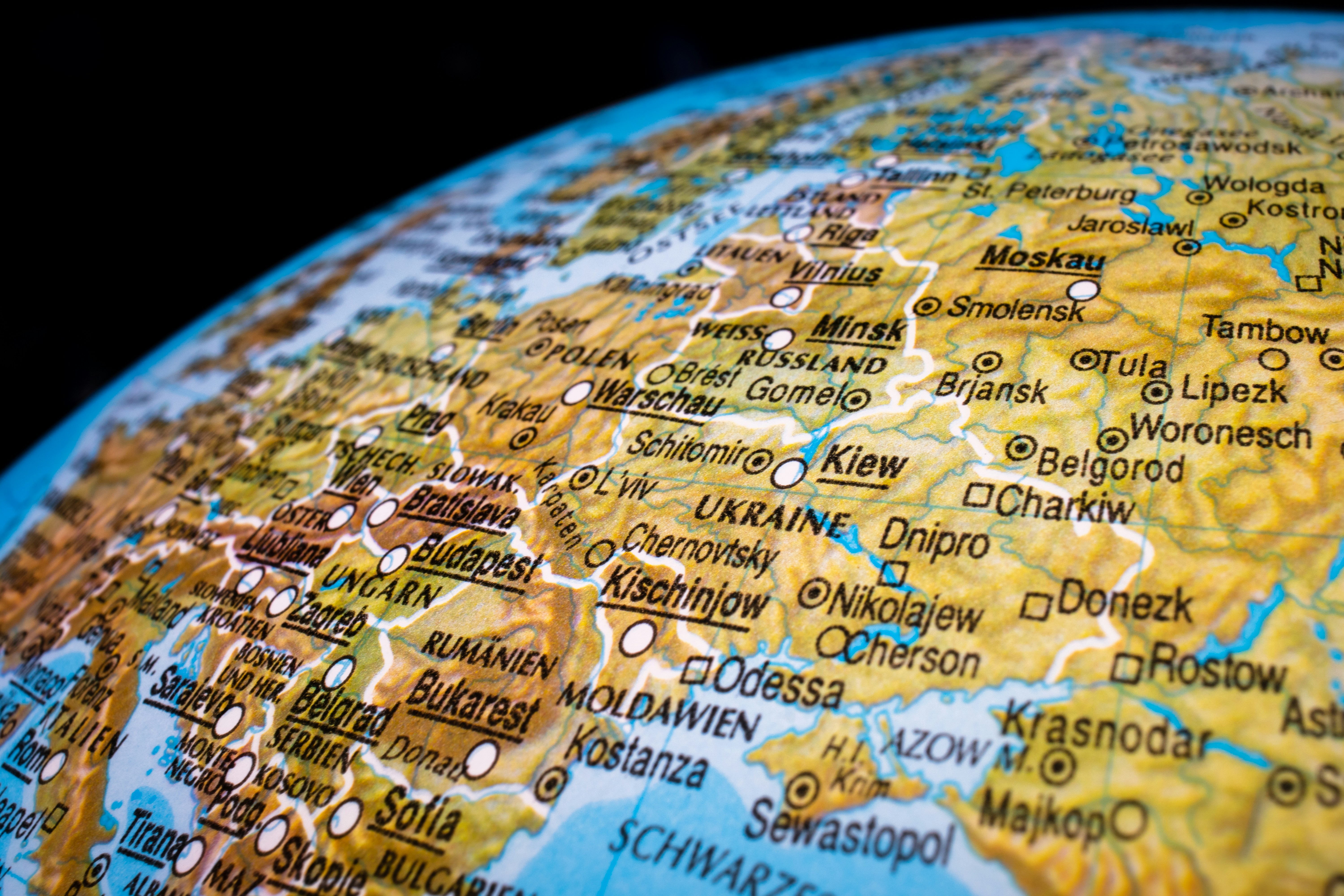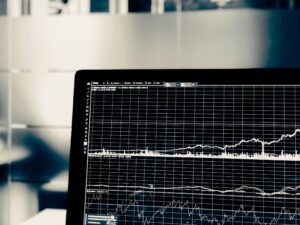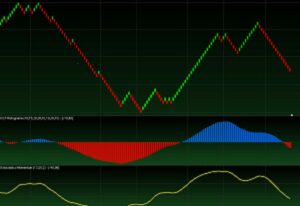
Yuichiro Chino/Second through Getty Photographs
Episode Description
Within the ever-evolving panorama of geopolitics, the world finds itself at a pivotal juncture marked by structural shifts that redefine world dynamics. The emergence of competing financial and geopolitical blocs stands out as a distinguished characteristic reshaping alliances and influencing worldwide relations. Catherine Kress, head of Geopolitical Analysis and Technique at BlackRock, joins Oscar to discover the macro and funding dimensions of this megaforce, the complicated interaction of geopolitics and world markets and supply insights for traders navigating this new period.
Transcript
Oscar Pulido: Welcome to The Bid, the place we break down what’s occurring within the markets and discover the forces altering the economic system and finance. I am your host, Oscar Pulido.
Within the ever-evolving panorama of geopolitics, the world finds itself at a pivotal juncture marked by structural shifts that redefine world dynamics. The emergence of competing financial and geopolitical blocs stands out as a distinguished characteristic reshaping alliances and influencing worldwide relations.
As we have discovered on earlier episodes, the BlackRock Funding Institute has outlined 5 mega forces which can be shaping the macroeconomic panorama. And geopolitical fragmentation is certainly one of them.
To assist me discover this matter, I am happy to welcome Catherine Kress, head of Geopolitical Analysis and Technique at BlackRock. Collectively we’ll discover the macro and funding dimensions of this megaforce, the complicated interaction of geopolitics and world markets and supply insights for traders navigating this new period.
Catherine, thanks a lot for becoming a member of us on The Bid.
Catherine Kress: Thanks for having me.
Oscar Pulido: So Catherine, we have been speaking to Alex Brazier from the BlackRock Funding Institute, and one of many issues that he is been mentioning, and that truly has been a standard theme all through numerous our episodes, have been the mega forces of which there are 5, synthetic intelligence, getting old demographics, the transition to a low carbon economic system, the way forward for finance, and final however not least, geopolitical fragmentation. Discuss to us a bit of bit concerning the geopolitical panorama and what’s altering.
Catherine Kress: So, I feel it is vital to take a step again and for those who suppose actually to the final half decade or so, it is clear that we have had these cascading occasions which can be actually constructing on one another and now dangle over the worldwide economic system.
We had the US commerce wars again in 2018, 2019, which prolonged into the Covid pandemic, Russia’s invasion of Ukraine, and now the outbreak of struggle within the Center East. These occasions are actually beginning to construct on one another and drive structural change within the world economic system. Our BlackRock view is that geopolitics from an funding perspective has develop into a persistent and structural market danger.
We noticed final 12 months S&P 500 executives use the phrase geopolitics 12,000 instances, which was up 3 times relative to 2 years in the past. In case you take a look at our proprietary BlackRock geopolitical danger indicators, we see them hit their highest degree within the final 12 months. All through historical past, the affect of geopolitics on markets, economies has been pretty short-lived. It has been modest, markets have tended to fade geopolitical shocks once they occur. We really did a examine a number of years in the past throughout the funding institute of historic danger occasions, and that is what we discovered that these occasions had a reasonably short-lived, oblique market affect.
We see at the moment’s occasions as completely different. We consider that they are driving structural long-term change, and the world order that is rising actually stands in sharp distinction to this post-Chilly Struggle interval, which was characterised by US hegemony, constructive and productive relations between main nations, decrease commerce boundaries, ever growing globalization. We see at the moment’s atmosphere as completely different, it is pushed by the emergence of competing financial and geopolitical blocs, competitors between these blocs and more and more much less worldwide cooperation.
Oscar Pulido: You talked about the occasions that you simply look again on over, I think about, many many years. And the truth that the affect on markets was modest and short-lived, however you have additionally stated we’re in a structurally completely different world with respect to geopolitics. So is it truthful to say that going ahead market affect might be much less short-lived and extra impactful?
Catherine Kress: Positive, I imply this can be a dialogue that we’re having proper now: has the atmosphere modified that a lot that markets needs to be treating geopolitical occasions otherwise? Our view is, sure. The world at the moment is much more linked than it was once 4 or 5 many years in the past. So, a danger or a disaster in a single a part of the world can actually emanate and have ripple results to different areas and different points.
Oscar Pulido: You talked about the Russia, Ukraine struggle, folks noticed their meals costs going up and a few of that’s due to the manufacturing of grains in that a part of the world that was impacted. You additionally talked about competing financial blocs, competing geopolitical blocs which can be being shaped. So, discuss a bit of bit extra about that evolution.
Catherine Kress: So actually, during the last a number of years, we have seen the rise and emergence of those competing financial geopolitical blocs. This is likely one of the key fixtures of this fragmented panorama. On the one hand, you will have the US which is as unified because it’s ever been with its allies in Europe and Asia.
You see that with the growth and solidification of NATO in response to Russia’s invasion of Ukraine. We have seen the rise of multilateral fora like AUKUS and the Quad, however in the meantime now we have China and Russia who’re cooperating extra intently than they’ve, and so they’re partnering with nations like Iran and in some circumstances North Korea. These powers are working collectively extra intently than they’ve in many years, and that is one thing that we have actually seen evolve and deepen during the last a number of years.
I discussed Russia and China rising significantly shut. There’s been some fascinating knowledge factors not too long ago that present that. So, for instance, China Russia greenback denominated commerce final 12 months hit $240 billion, which was 26% enhance from a 12 months earlier. At this time, China trades extra with Russia than it does with Germany. In case you take a look at China’s exports of transportation gear particularly to Russia, that is up 800% since Russia’s invasion of Ukraine. And we now see that Chinese language vehicles make up 55% of the Russian market.
However I discussed this casual alignment, deepening as nicely between Russia, China and North Korea and Iran, and there is some fascinating knowledge factors right here as nicely. For instance, Iran has develop into a principal provider of drone expertise to Russia. We have seen North Korea present extra munitions to Russia in its invasion of Ukraine than Europe has offered to Ukraine. And Russia’s offering its companions with provides too, for instance, low-cost power, pure gasoline. More and more, there’s considerations about Russia exporting navy expertise and gear to Iran and North Korea. So we’re seeing these blocs harden and so they’re more and more aggressive with one another.
Oscar Pulido: And on the similar time that these blocs are forming, I feel there’s one other time period that you have used, that are these multi-aligned nations, which can be additionally creating. I am considering of those nations as I feel they’re pals with everyone, or not less than possibly they are not taking a specific facet in relation to a few of these financial blocs. However possibly assist make clear, once we say a multi aligned nation, what does that imply and what are some examples of a few of these nations?
Catherine Kress: So, these are the nations that have not taken sides within the contest between the US and China, or essentially adopted the western place on Russia. They’re very completely different from the non-aligned motion of the Chilly Struggle. So, we have chosen the phrase multi-aligned as a result of we see these nations as essentially completely different.
The non-aligned motion of the Chilly Struggle was way more about statements and posturing and protests. At this time, the multi-aligned nations are main economies on the earth which have a whole lot of energy and affect.
The Economist calls them the “Transactional 25” or the T25. Collectively, the T25 make up greater than half the world inhabitants and a couple of fifth of world GDP, which is greater than the EU. The multi-aligned nations are pragmatic. They’ve a fluid transactional strategy to the world. In a manner, they’re unsure concerning the future distribution of energy, and they also’re hedging their bets and aligning with each blocs in keeping with their nationwide pursuits.
An particularly vital grouping of multi-aligned nations are the nations within the Center East. So, years of excessive oil costs have made the nations, the Gulf Oil producers particularly, actually main sources of liquidity within the markets. we expect that they are at an inflection level. They’re going to be the final one standing in fossil fuels. They’ve huge alternative if they will proceed to take care of fiscal self-discipline, if they will handle regional tensions.
However one other multi-aligned participant to look at is India. India’s already the world’s most populous nation, its working inhabitants is anticipated to hit a billion inside a decade. It is projected itself as a pacesetter of the worldwide south.
So, now we have demographics alongside macroeconomic stability, in addition to a deal with bodily and digital infrastructure that I feel make India rather well poised, to compel world progress going ahead.
Oscar Pulido: One of many issues that emerged post-Covid was this recognition on the a part of corporations to convey manufacturing nearer to dwelling. Prioritizing resiliency greater than price, I feel is a whole lot of what we have talked about with a few of our visitors on the podcast. And a few folks discuss this as de-globalization that after many many years of globalization, now we’re stepping into reverse. Possibly Alex Brazier has talked about it because the rewiring of globalization. So, what’s the proper time period and do you agree with this and what are the form of the impacts if this development in truth is going on?
Catherine Kress: I very a lot agree with the framing because the rewiring of globalization. I do not suppose it is right to say that the world is deglobalizing, that we have hit the top of globalization. There are measures of globalization which have receded. For instance, commerce as a share of GDP for the reason that monetary disaster. However there are different areas the place we’re seeing fast globalization like digital commerce and companies.
However I do suppose it is truthful to say that the system of globalization has been politicized and that we’re seeing points, as you stated, like nationwide safety resilience, more and more making their manner into financial coverage, enterprise resolution making, and we’re seeing nations and corporations leverage focused insurance policies like export controls, tariffs, funding restrictions, commerce agreements with like-minded nations to realize financial and coverage goals.
So, our view is that globalization is rewiring, and this can be a dynamic that we had been hypothesizing for a while that nationwide safety and resilience would drive this rewiring and more and more play virtually a much bigger function than conventional financial and market elements like pure price effectivity, comparative benefit, in provide chain choices.
And more and more, there is a important mass of research popping out that helps that speculation. That coverage and geopolitics are driving this rewiring of globalization, and at a excessive degree, it reveals that commerce is not essentially declining, however it’s shifting, and we’re seeing this in a few particular areas.
First, we’re seeing that commerce between geopolitical blocs is slowing. So, since Russia’s invasion of Ukraine, the World Commerce Group has reported that commerce between geopolitical blocs has grown 4-6% slower than commerce throughout the geopolitical blocs. And at the moment, China’s buying and selling extra with creating nations than it’s with the US, Europe, and Japan mixed. So, we’re seeing that type of shift among the many blocs.
Second, we’re seeing some diminished dependence on cross border suppliers. So, there is a component of that reshoring that is going down. Third, and that is what I feel is essentially the most fascinating and presents an funding alternative, which is that as we see commerce between the blocs decline, we’re seeing the rising up of nations, which Bloomberg has known as the connector nations.
These are the nations which can be injecting themselves into world provide chains and turning into intermediaries. So, as US direct sourcing from China declines for instance, nations like Vietnam, Mexico, Indonesia, Morocco, Poland are inserting themselves into world provide chains, and China’s buying and selling extra with them and so they’re buying and selling extra with the US.
So, the US is not essentially decreasing commerce publicity to China solely, but it surely’s being extra intermediated. These nations, in accordance with one Bloomberg evaluation, reported $Four trillion in financial output in 2022. They’ve all seen commerce develop above development for the final 5 years. So, they mirror a very fascinating and vital alternative going ahead.
Oscar Pulido: So, let’s return to the truth that you stated a few of these geopolitical adjustments, or all of the geopolitical adjustments you are mentioning are extra structural in nature. That this is not only a one- or two-year sort of development, however that, the world is essentially shifting. So, what does that imply for future geopolitical shocks, like how ought to an investor or simply people be enthusiastic about them versus what they’ve seen previously?
Catherine Kress: So, we had this dialog with numerous our traders not too long ago, and I assumed one thing that was fascinating that emerged from that dialog is that fragmentation by itself would not essentially must massively disrupt core funding theses, it is a structural development as I stated. So, there are parts of it that we will observe, that we will construct into our funding hypotheses. We might get to a extra steady world order over the long run, however the path to getting there in our view goes to be very rocky. And so, what’s important for us to look at as traders is whether or not this type of transition to a extra fragmented world order is a managed and orderly one, comparatively talking, or a chaotic and disorderly one.
By all counts, we’re in a extra risky world order proper now. The UN reported final 12 months the most important variety of violent conflicts underway since World Struggle II and we’re going through the most important election 12 months in historical past with 76 nations or so going to the polls subsequent 12 months. So we are attempting to establish what are the forms of dangers that would change that fragmentation path and disrupt core funding theses. There is a vary of them, we characteristic our type of prime 10 dangers on BlackRock’s geopolitical danger dashboard, which you’ll be able to see on the net, however I am going to point out three particularly. So, the primary is the competitors between the US and China. We see US China competitors actually as the brand new regular for US-China relations.
It is centered on the protection space, but it surely’s centered very sharply within the expertise space. The place the US is basically pursuing a coverage of defending, defending, extending its lead in essentially the most superior applied sciences that it sees as having navy purposes like AI, quantum computing, semiconductors. China is responding by investing in its personal indigenous applied sciences, which we consider will result in parallel competing tech stacks for a very powerful applied sciences.
That is one space that we’re watching. However a battle over Taiwan, battle within the South China Sea can be massively disruptive to markets. So, these type of aggressive dynamics are areas we’re monitoring. One other space is the continuing battle in Ukraine. At this stage, we do not see a diplomatic resolution as seemingly within the close to time period.
We consider a long-term standoff between the west and Russia is probably going. So, we’re simply ever monitoring the potential danger of escalation there. After which third, now we have the continuing struggle within the Center East and right here, we’re very intently monitoring the chance of escalation as nicely. We have seen current assaults on transport within the Crimson Sea for example of how conflicts can disrupt transport, result in greater manufacturing prices, contribute to potential inflationary outcomes.
So, these are forms of geopolitical dangers we’re monitoring as affecting the trail of fragmentation going ahead.
Oscar Pulido: And it is price mentioning the geopolitical danger indicator that you simply discuss. There may be, I feel you talked about 10 completely different geopolitical dangers that you simply’re monitoring, however you do not essentially view the chance of all of them the identical. The dangers can fluctuate primarily based on what you are observing available in the market.
Catherine Kress: Completely. So, one factor that we attempt to do as we assess the dangers is present each type of a subjective evaluation as to how we see the dangers evolving, however then additionally a quantitative evaluation as to how markets are listening to them if they’re or aren’t.
So, these geopolitical danger indicators that now we have are a quantitatively pushed measure of market consideration or investor concern a couple of explicit geopolitical danger, and it is a form of proxy for market pricing. Our perception is that if markets are listening to a danger, it is extra seemingly they’re pricing that in. So we attempt to establish the disconnects between our subjective evaluation primarily based on material consultants, and this quantitative evaluation primarily based on pure language processing of brokerage studies, monetary information, media, and the like.
Oscar Pulido: And the inverse of that’s the place you suppose the market just isn’t paying sufficient consideration to a geopolitical occasion. It may really pose the next danger as a result of markets are ignoring it and possibly they should not be.
Catherine Kress: Precisely.
Oscar Pulido: Can we simply discuss then lastly concerning the backside line for traders? If I am listening to this and enthusiastic about the structural adjustments in geopolitics and what which means within the years forward, what does that imply for my portfolio? You talked about that funding groups should not essentially, in your opinion, be altering their core funding thesis, however what does an finish investor want to consider?
Catherine Kress: So, the geopolitical moderation of the post-Chilly Struggle interval that we talked about was typically supportive of decrease inflation and better progress.
We see this era of geopolitical fragmentation as inflationary and doubtlessly more likely to dampen progress going ahead. We fear that as provide chains get longer and extra complicated, that’s going to be costly. It may weaken productiveness in developed markets. After which in the meantime, now we have structural financial challenges in China, which may current a drag on world progress going ahead.
So, from a macro perspective, we see geopolitical fragmentation as inflationary and more likely to affect progress in a detrimental manner. However from an funding perspective, we’re taking a look at relative alternatives the place issues are priced or not priced. And we will take a look at this geographically. So, for instance, the connector nations that I discussed are already benefiting from a diversion of commerce and funding flows.
So, we expect that there could possibly be relative alternatives in these nations. From a sectoral perspective, a parallel dynamic that is underway is, as nations are – as these blocs are hardening as nations are turning inward, we’re seeing a surge of commercial coverage in strategic sectors and areas of focus like clear power, like superior expertise.
And so, we will take a look at a few of these areas for alternative as nicely. So, the underside line for traders is that whereas fragmentation could also be inflationary and affect progress over the long run, we see relative funding alternatives each geographically and on the sector degree.
Oscar Pulido: And it rhymes with what the BlackRock Funding Institute and Alex have been speaking about being nimble, being agile, and maybe being extra granular on this new macro regime that we discuss.
Catherine Kress: Precisely, and fragmentation will create dispersion. And in order that does enable funding talent to shine on this atmosphere.
Oscar Pulido: Catherine, listeners who’ve been following the podcast intently will know that you’ve got each hosted and now, served as a visitor of the podcast. So I hope you loved sitting within the different chair at the moment. Thanks for becoming a member of us on the Bid.
Catherine Kress: Thanks for having me.
Sources
‘With Highest Variety of Violent Conflicts Since Second World Struggle, United Nations Should Rethink Efforts to Obtain, Maintain Peace, Audio system Inform Safety Council’ UN Press Launch January 26th 2023;
‘2024 Is the Largest Election 12 months In Historical past, The Economist Nov 13th 2023
These 5 International locations Are Key Financial ‘Connectors’ in a Fragmenting World, Bloomberg November 2nd 2023
The Bigger Geopolitical Shift Behind Iran’s Drone Gross sales to Russia, Carnegie Endowment For Worldwide Peace, October 26th 2022
Struggle in Ukraine Has China Cashing In, New York Occasions, December 21st 2023
Robin Brooks, X
China-Russia 2023 commerce worth hits report excessive of $240 bln – Chinese language customs, Reuters, January 12, 2024
“Gauging geopolitics”, BlackRock Funding Institute
The International Financial system Enters an Period of Upheaval, Bloomberg, September 18th 2023
Disclosure
This content material is for informational functions solely and isn’t a proposal or a solicitation. Reliance upon data on this materials is on the sole discretion of the listener.
For full disclosures go to Blackrock.com/company/compliance/bid-disclosures
This submit initially appeared on BlackRock.




